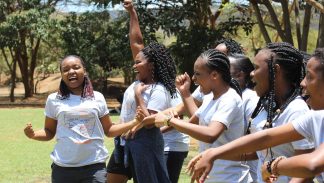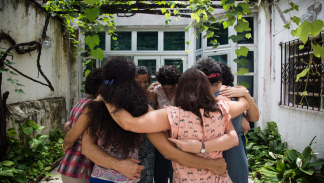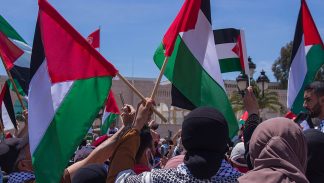In the aftermath of Hurricane Matthew, women in Haiti need your support
Update: October 13
“Women and girls are in a very difficult situation, catastrophic, almost apocalyptic. But the Haitian people, especially Haitian women, are very courageous. We know how to keep our head above water and we will continue to fight. For us, life is a perpetual struggle.” – (Marie) Michelle Vernet, Collectif Feminin Haitien pour la Participation Politique des Femmes (FANM YO LA), Global Fund for Women grantee partner
The devastation in Haiti following Hurricane Matthew is extreme: recent estimates declare more than 900 people dead and 2.1 million affected. 90% of some areas of southern Haiti are thought to have been destroyed and the lack of clean drinking water carries threats of a cholera crisis. Global Fund for Women’s partners on the ground are actively surveying the situation, working quickly to address the immediate needs of women and children.
“There is so much damage and destruction—houses, plantations, livestock; everything has disappeared and many people died,” explain Mikelita Jean and Malia Jean, Coordinators of Global Fund for Women grantee partner Association des Femmes Haïtiennes Infectées et Affectées par le VIH (Association of Haitian Women Living With and Affected By HIV, or AFHIAVIH), which was founded in 2007 to empower and meet the unique needs of women and children affected by HIV in Haiti. “People are in the street because even the shelters have been destroyed. Women and girls are the most vulnerable.”
Women on the ground in Haiti who are part of Global Fund for Women’s network of grantee partners and advisors emphasize the urgent need for shelter for women and children. They say that children are in the streets and exposed to the extreme sun, and women are getting vaginal and bladder infections due to a lack of sanitary conditions, clean water, or clean underwear and clothing.
On top of this, the looming spread of cholera is bringing renewed fear that the situation could worsen. “We face another potentially catastrophic threat, cholera, as the drinking water supply is not clean,” says Elvira Eugene from Global Fund for Women grantee partner Association Femmes Soleil D’Haiti (Sun Women’s Association of Haiti, or AFASDA), which has been building a grassroots movement to advance women’s human rights in Haiti since 1997.
Despite the severe destruction, women in Haiti are ready to lead recovery. Global Fund for Women’s grantee partners are already acting to fill gaps in immediate relief and planning how best to meet the unique needs of women and children.
“We have collected a list of cases to help KOFAVIV members find their families in extremely difficult circumstances,” explains Josie Philistin from KOFAVIV, the Commission of Women Victims for Victims, a longtime Global Fund for Women grantee partner in Haiti. “Through our call center, a free national hotline, we receive calls requesting aid for prevention and control against cholera and violence, as well as for assistance with hygiene kits and basic supplies.”
The women we are speaking with are developing plans of action to ensure that funding is used most effectively to get services and assistance to those who need it most. These grassroots women’s groups have deep roots in their communities and are well-equipped to meet the acute needs of women and children in the aftermath of this crisis.
For instance, Nadine Louis, Executive Director of Foundation TOYA, which operates a girls club in hard-hit Les Cayes, shared that they are focusing on girls’ needs, ensuring their safety, and helping them to get back to school, as most schools have been damaged and remain closed.
“Girls, after any disaster, are usually the last to receive the help or attention they need. All too often, they become victims,” expressed Nadine. “Funding will help us ensure that girls have access to [Foundation TOYA’s] girls’ center in Les Cayes, have school supplies, and have safe spaces to go as rehabilitation efforts begin.”
It is vital that women play leading roles in immediate crisis relief and response, as well as long-term recovery and rebuilding in Haiti. Investing directly in local women’s groups in Haiti is absolutely critical following Hurricane Matthew.
“Women’s groups desperately need funding,” explains Global Fund for Women’s advisor Tania Pierre-Charles. She added that money will “make a world of difference for grassroots organizations to be able to recover their work space and resume the provision of their vital services to women and girls at this critical time.”
“A big thank you to Global Fund for Women for triggering a solidarity movement and raising awareness for Haiti,” expresses Elvira Eugene. Show your solidarity with the resilient women in Haiti by making a gift today.
Update: October 7
After making landfall on Tuesday as a Category 4 storm, Hurricane Matthew has left Haiti with what the UN has called its worst humanitarian crisis since the devastating earthquake six years ago. Nearly 1,000 people are reported dead by officials, with others injured or missing. The government has estimated that 1.4 million people need assistance.
Global Fund for Women is reaching out to our partners in Haiti to better understand the situation. Evelyne Denis, a nurse who works with Global Fund for Women’s longtime grantee partner Groupe d’Appui au Développement du Sud (Support Group for Development of the South, or GADES), spoke with us from Les Cayes, one of the towns in southern Haiti hardest hit by Hurricane Matthew. She was sitting on a pile of wood. She says the situation is horrible and there is debris everywhere. All communication about aid and relief is being done by word of mouth because there’s no operating infrastructure. People are in the streets, girls among them, working to clean up and try to create order. The biggest need right now, says Evelyne, is food and clean drinking water—all they’ve had since Wednesday is coconut water and coconut meat. Evelyne and others are trying to treat those wounded as best they can, with limited medical supplies.
“Many houses were destroyed, especially those with sheet metal roofs, which flew off under the gusts of wind; even if the walls remain, [houses are] damaged,” adds Magaly Guervil, Vice President of GADES, which has been working to end gender-based violence and advance women’s rights in Haiti since 2004. “The population of Les Cayes and GADES greatly need financial support in this emergency.”
Global Fund for Women’s advisor Tania Pierre-Charles spoke with us from Port-au-Prince, the capital of Haiti, also emphasizing that the situation is very serious and people in the south of Haiti are completely cut off from the rest of the country. There is no phone service or Internet and the electricity is down. According to Tania, who works mostly with women in the south of Haiti, many people have lost everything. A bridge connecting the south of the country has been completely destroyed, stranding people in need. She believes that the government is planning to bring in aid for the area by helicopter.
Global Fund for Women’s grantee partners—local, women-led groups with deep roots in their communities—are in a unique position to assess the damage and address the unique needs of women and children. We know that women and children are disproportionately affected by crises and can be at increased risk of violence in the aftermath of disasters. Women’s health care needs like access to sanitary napkins and contraception, and maternal, newborn, and post-natal care are often overlooked by relief efforts.
In Haiti, as we learned following the 2010 earthquake, disaster can pose a severe risk to women in terms of increased sexual violence and erosions in women’s rights. Our local partners are able not only to provide women with information on accessing services and shelter, but to educate and empower them about their human rights.
Global Fund for Women’s experience—including over 20 years of grantmaking in Haiti—has shown us how vital it is that women play leading roles in immediate crisis relief and response, as well as in long-term recovery and rebuilding. Investing directly in local women’s groups in Haiti is absolutely critical following Hurricane Matthew.
In hard-hit Les Cayes, in addition to GADES, Dynamic Women of the South Solidarity Network (KOSOFADS) is assessing damage and working to better understand the situation for women and girls, but ready to lead emergency work and relief efforts, shared KOSOFADS’ coordinator Marie Irnande. KOSOFADS has been working since 1997 to promote women’s safety, economic independence, and access to health care. KOSOFADS—which Global Fund for Women has funded since 2002—brings poor and rural women together to train them in women’s rights and counter domestic violence.
Another longtime Global Fund for Women grantee partner in Haiti, KOFAVIV, the Commission of Women Victims for Victims, was formed in 2004 by a group of rape survivors in order to meet the needs of thousands of women and children who have survived sexual violence and slavery. KOFAVIV ensures the well-being and safety of women by providing clinics and shelters. The group is among the first responders to incidences of sexual violence, caring for survivors and helping them to access justice and demand accountability. Providing free medical, legal, and psychosocial support to survivors of gender-based violence, KOFAVIV works with other local women’s groups to lead a powerful women’s movement to end epidemic levels of rape and sexual violence in Haiti.
In 2010, in the aftermath of the devastating magnitude 7 earthquake that destroyed much of Port-au-Prince and killed as many as 300,000 people, Global Fund for Women raised over $100,000 from generous donors around the world to invest in our grantee partners leading relief and recovery on the ground. Among the critical work that was funded by crisis grants, was the work of CAFRA, the Caribbean Association for Feminist Research and Action. The group worked to assess the situation facing women and helped organize immediate efforts on the ground. Within a week, feminists throughout Latin America and the Caribbean joined Haitian women’s groups to establish the Myriam Merlet International Feminist Solidarity Camp, named in honor of the late Haitian feminist leader who died in the earthquake. The camp, led by two Global Fund for Women grantee partners, provided medical services, psychosocial counseling, and legal services. In addition, Global Fund for Women grantee partner Feminist International Radio Endeavor (FIRE) established a radio station to broadcast women’s stories and to coordinate the delivery of humanitarian supplies and aid.
Haiti is the poorest nation in the Western Hemisphere and largely dependent on international aid. Our partners tell us that this aid does not reach the grassroots or women’s groups. Help Global Fund for Women to bridge the gap to ensure women can help lead the immediate relief and long-term recovery, and address the unique needs of women and children.
Donate Now to support Global Fund for Women's Crisis Fund for Haiti
Donate now to Global Fund for Women’s Crisis Fund for Haiti to support the acute needs of Haitian women following Hurricane Matthew. Please give generously today to help women who are working to rebuild their communities after the devastating storm.


